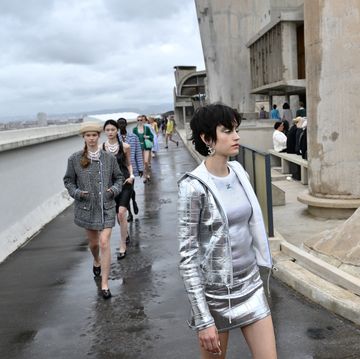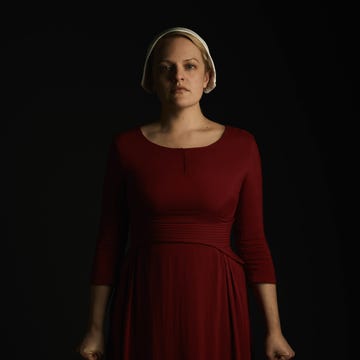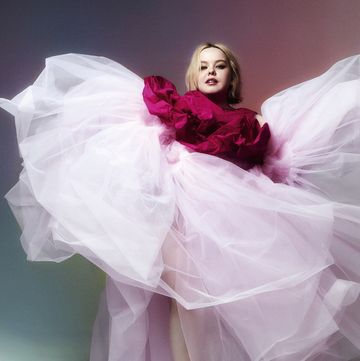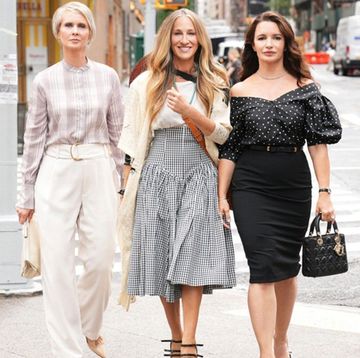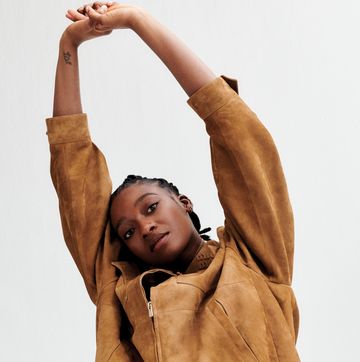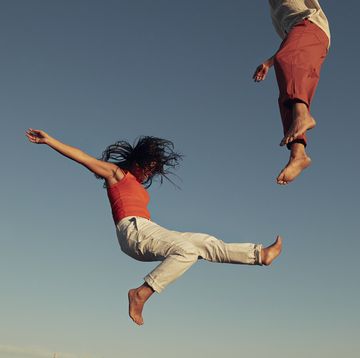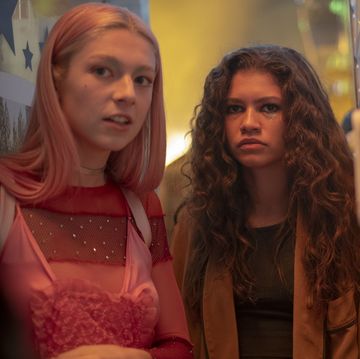For some of us, a good cry is conducive to a clearer head and an equalized emotional state. Some attitudes say it's a sign of weakness, that should be reserved only for the death of much loves pets the the absoloute highest-ranking rom coms. The BBC has released a new report today on the age old question of mind of matter, science over sentiment. And though it acknowledges that some types of 'crying' (like the kind you do when you're cutting onions or knock your nose) are definitely different to crying-crying (that's the kind that comes with hawking sobs and snotty noses) there's a whole load of theories about why we've evolved to expel our emotions through our tear ducts. Marisa Meltzer discusses her complex relationship with letting it all out...
I never cry. When my 16-year-old bulldog died this year, I didn't cry. Nor when I was stood up on a Tinder date, nor when someone else was offered a job I wanted, nor during a screening of The Fault in Our Stars. When my dad told me he was getting an MRI for some health issues that could be serious, I said, 'I love you'. But I didn't choke up.
Sure, I've had some memorable meltdowns: sneaking off to a storage room during a particularly ego- destroying magazine job; watching the man I was dating leave to go and visit a friend the day I had to take the morning-after pill; the time my friend Katy had a better Halloween costume than me in primary school. And, while I still do occasionally feel sad, my coping mechanisms are bowls of pasta and racking up net-a-porter.com debt, not tears.
Last week I ran into a friend on her way to therapy. 'Now that I'm in therapy, I cry all the time,' she told me. I remarked that I'd been in therapy for years, for mild depression and anxiety, and couldn't recall crying once. She looked at me like I needed more therapy.
So in my next session, I asked my psychiatrist what he thought it meant that I never cried. 'You've never cried frequently as an adult,' he said, looking up from his notebook. 'If you're happy and it's working for you, don't worry about it.' I went back to complaining about an expensive wedding I had to attend.
Later, I was interviewing the feminist writer and activist Caitlin Moran, who mentioned how people have cried at some of her stand-up gigs. I asked her if she herself cried easily. 'Oh yeah, God, absolutely. I cry at least once a day,' she said. 'I recently cried over one little electric car parked between all of these larger cars and it looked like it as being bullied. It was me when I was in school! I was that tiny car.' When I confessed I hadn't cried in years, she looked at me very intently and said, 'It's my understanding that tears are like ejaculate for the eyes. You must be really pent up.'
Crying is having a bit of a feminist moment. There is an entire female reclamation of tears happening online, where women who have been told for years that to cry in public – especially at work – is to lose all credibility are now flaunting their waterworks. There are several Tumblrs devoted to images of girls ostentatiously crying, such as Pretty Girls Crying.
So Sad Today is a Twitter account with 173,000 followers (sample tweet: 'probably crying'); an acquaintance I follow on Twitter, who has a powerful job in media, tweets maybe five times a week about her fits of tears that strike sometimes when she's alone, sometimes in front of colleagues. I veer between being envious of how unapologetically vulnerable and honest she is, and wanting to shake her by the shoulders and tell her to snap the hell out of it. But it raises a question: why does everyone now seem to be embracing a good cry?
Scientifically speaking, there are three kinds of tears. Two of them – basal tears for lubricating the eyes and reflex tears when chopping onions – have nothing to do with feelings. One theory about the third kind, emotional tears – those of happiness, sadness, and relief – is that, to Moran's point, built-up stress chemicals release when you cry. 'So it's the secretion and excretion of tears that are important,' says William Frey, a professor of pharmaceutics who has researched crying. 'People may feel better after crying because they're removing chemicals that build up during emotional stress.' Hence why we feel better after crying, after 'getting it all out,' as people often say.
Despite the image of the lonely spinster sobbing herself to sleep, the truth is that people in relationships cry more often than singles, probably due to the fact that the former tend to need to work out more conflicts and have more emotional ups and downs, according to Dr Lauren Bylsma, an assistant professor of psychiatry at the University of Pittsburgh. Ad Vingerhoets, professor of medical and clinical psychology at Tilburg University in the Netherlands and the author of Why Only Humans Weep: Unravelling the Mysteries of Tears, found that countries where people report the highest levels of happiness – and feel the least amount of shame around crying – actually cry the most. The biggest criers in the world? The chilly Scandinavians.
Women cry more often than men do: an average of 30 to 64 times a year, compared with men's six to 17 times a year, according to a 2009 report cited by the German Society of Ophthalmology. Differences in hormones could be a contributing factor – testosterone may inhibit crying, while the hormone prolactin, which measures higher in women, may encourage it. But socialisation also plays a role. (I've listened to The Cure's Boys Don't Cry enough times that I believe there's something to that.) Maybe I've been socialised like a boy? I've always had a lot of male friends, and been bold in my opinions and measured in my emotions. But that's describing masculinity in broad and outdated strokes. In an era of footballers regularly bawling on TV, it's becoming gradually more acceptable for boys to break down too.
We think we cry when something causes tension or arousal, such as confrontation. 'But that's not when the crying occurs,' says Dr Jay Efran, emeritus professor of psychology at Temple University. 'It occurs when there's a switch over to recovering, letting go, and recalibrating.'
In 2009, on her blog Café Con Lesley, Lesley Arfin, the author of the memoir Dear Diary, who has also written for Girls, wrote a post about crying. 'A real cry comes with heaving sobs from an ancient place deep down. A cry that feels like you're releasing years of your life and everything you've ever cried about is suddenly happening all over again.' Intrigued, I call her to see if I can glean anything from her theory.
'With those kinds of cries, there's no inhibition, and they're so cathartic and freeing,' she says – she calls them 'trauma cries'. I ask what triggers hers. 'My biggest fear is that all of my instincts are wrong; that feeling like you thought you could handle something and you were wrong. That is a very threatening feeling.' She tells me about once trying out a joke in a room full of comedy writers who didn't laugh, and how it brought her back to being picked last in grade school PE. (Being picked dead last in PE was a regular occurrence for me, but I don't ever recall crying about it. Though it' s possible I've just blocked out every memory of PE.)
Onward. I assume PR maven and blunt America's Next Top Model judge Kelly Cutrone, whose business-memoir-manifesto was titled If You Have To Cry, Go Outside, will be a fellow non-sob sister. Wrong. 'I don't think it's professional to cry at work, but I'm not against crying. There is just a time and a place for your tears,' she tells me. She cried when she took her daughter to an exhibition on the suffragette movement and also while watching Blackfish (a documentary about the plight of a captive orca whale). She suggests I watch it too, to unleash the floodgates. I do not.
There's a more evolutionary purpose to crying: to show that there's a problem and elicit support. Bylsma says that a person you're fighting with, for example, 'might back down in a conflict situation'. As Vingerhoets explains, there are two main reasons people cry: being separated from an intimate relationship (homesickness or a breakup) or feeling powerless. 'It's when you don't have an adequate response available for the situation you're in,' he says. Women tend to cry more frequently during conflict than men, but men cry just as frequently as women over loss. When it comes to predicting what kind of crier you're going to be, Vingerhoets says: 'The first thing I would wonder is, "How about your parents?"'
Some of this comes down to nature – like how prone you are to depression, which can be genetic – but it's also about the kind of environment you were raised in. My father, though mellowed out by midlife, was the kind of person who was easily set off, and his anger and cursing rampages didn't frighten me as much as embarrass me. Even though our personalities were similar, I made a conscious decision early on that I would never mirror his behaviour. As for my mother, I thought she felt things too much and cried too easily. I knew I never wanted my own righteous anger to manifest itself that way. So I shied away from my parents' broadcasted emotions and have been, since adolescence, much more reserved. I suppose I take some measure of pride in that.
While my friends wouldn't describe me as particularly steely, one admitted I wouldn't exactly be first on her list of people to cry in front of. I'll spend a whole dinner merrily gossiping, but I'm not the one most welcoming to cracks in the exterior. Maybe because I'm not very good at showing my own.
I had the perfect ending to this essay all planned out. Someone I interviewed would say something that moved me, or I'd read a particularly heartbreaking story in the news, and then suddenly I would be on the floor heaving with sobs, making up for all that lost time. I would affirm that a good crying jag made me feel pleasingly vulnerable, a better feminist, perhaps even ready to dabble in public crying. Alas, no such neat ending presented itself. Instead I just keep moving forward, trying to figure out life as I go along, like all women do. Except I'm the one doing it dry-eyed.


